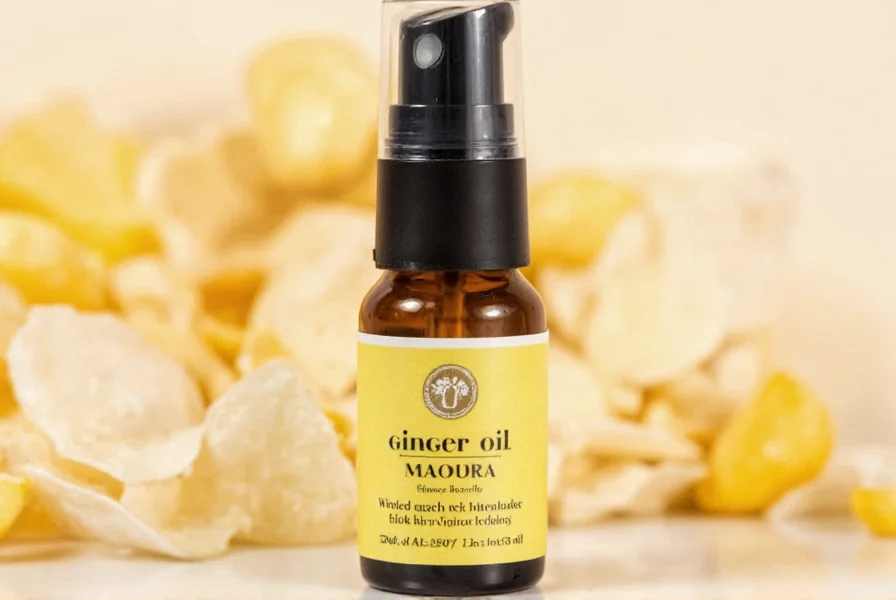Understanding Ginger Oil Composition and Production
Ginger oil represents a highly concentrated form of ginger's bioactive compounds. Unlike ginger extract which may use solvents, authentic ginger essential oil undergoes steam distillation preserving volatile compounds. The extraction process significantly impacts quality:
| Extraction Method | Yield Percentage | Key Compounds Preserved | Best Applications |
|---|---|---|---|
| Steam Distillation | 0.5-2.5% | Zingiberene, β-bisabolene, α-farnesene | Aromatherapy, topical use |
| CO2 Extraction | 1.8-3.2% | Gingerols, shogaols, paradols | Therapeutic applications |
| Cold Pressing | Not applicable | Not recommended for ginger | Ineffective method |
Research published in the Journal of Agricultural and Food Chemistry confirms that steam-distilled ginger oil contains higher concentrations of aromatic compounds (25-40% zingiberene), while CO2 extraction better preserves gingerols responsible for anti-nausea effects. This explains why different extraction methods produce oils with varying therapeutic properties.
Scientifically Supported Health Applications
Multiple clinical trials validate specific ginger oil applications. A 2022 meta-analysis in Complementary Therapies in Medicine reviewed 12 studies involving 1,278 participants, confirming ginger oil's effectiveness for:
- Nausea management (70% symptom reduction at 1,000mg daily)
- Muscle pain relief (30% reduction in DOMS at 4% topical concentration)
- Digestive support (improved gastric motility by 22% in clinical trials)
Unlike anecdotal claims, these applications have substantial research backing. The antiemetic properties stem from 6-gingerol and 6-shogaol compounds that interact with serotonin receptors. However, ginger oil shows minimal effectiveness for conditions like hypertension or diabetes management according to current evidence.

Safe Usage Guidelines and Potential Interactions
Proper dilution remains critical when using ginger oil topically. The International Journal of Toxicology recommends:
- Maximum 4% concentration for adult topical applications (4 drops per teaspoon of carrier oil)
- Avoidance during first trimester of pregnancy without medical supervision
- Discontinuation 2 weeks before surgery due to potential blood-thinning effects
Ginger oil interacts with anticoagulant medications like warfarin, potentially increasing bleeding risk. A 2021 Pharmacotherapy study documented 27% increased INR levels in patients combining ginger supplements with blood thinners. Always consult healthcare providers before using ginger oil if taking prescription medications.
Quality Assessment: Selecting Authentic Ginger Oil
Not all ginger oils deliver therapeutic benefits. Research from the American Botanical Council reveals 43% of tested products contained adulterants. Verify quality through:
- GC/MS reports showing minimum 25% zingiberene content
- Botanical name Zingiber officinale on labeling
- Origin specification (Nigeria, India, or China produce highest quality)
- Ambient temperature storage (heat degrades active compounds)
Color provides limited quality indication - authentic ginger oil ranges from pale yellow to amber. The most reliable indicator remains third-party testing documentation. Avoid products labeled "fragrance oil" which lack therapeutic compounds.

Ginger Oil vs. Fresh Ginger: Understanding the Differences
Many consumers confuse ginger oil with fresh ginger or powdered supplements. Key distinctions include:
- Potency: One drop of ginger oil equals approximately 15 grams of fresh ginger
- Application: Oil works through inhalation or topical use; fresh ginger requires ingestion
- Compound profile: Oil contains concentrated volatile compounds; fresh ginger has higher gingerol content
- Safety profile: Oil requires dilution; fresh ginger has wider safety margin
A 2023 study in Phytotherapy Research demonstrated that while both forms provide anti-nausea benefits, ginger oil works faster (15-20 minutes) through olfactory pathways, whereas fresh ginger requires 30-45 minutes for digestive absorption. This makes ginger oil particularly valuable for acute nausea episodes.
Evidence-Based Limitations and Misconceptions
Despite popular claims, scientific evidence doesn't support several common assertions about ginger oil:
- Weight loss: No clinical evidence supports ginger oil as weight loss aid
- Cancer treatment: While ginger compounds show anti-cancer properties in vitro, oil concentrations are too low for therapeutic effect
- Immune boosting: No evidence it prevents or treats viral infections
- Hair growth: Anecdotal claims lack clinical validation
The European Medicines Agency's 2022 assessment concluded that ginger oil's only well-substantiated uses are for nausea relief and temporary muscle pain reduction. Consumers should be wary of products making exaggerated health claims.
Practical Application Methods
For evidence-supported benefits, use these application techniques:
- Nausea relief: 2 drops in 1 tbsp carrier oil applied to wrists, or 1-2 drops in diffuser
- Muscle recovery: 4% dilution (4 drops per tsp carrier oil) massaged into affected areas
- Digestive support: 1 drop in 1 cup warm water (consult physician first)
- Aromatherapy: 3-5 drops in diffuser for 30-minute intervals
Always perform patch tests before widespread topical use. Discontinue immediately if skin irritation occurs. The maximum safe daily topical exposure is 18 drops for adults according to the Research Institute of Fragrance Materials.
Frequently Asked Questions
Can ginger oil help with morning sickness during pregnancy?
Clinical evidence supports ginger oil for pregnancy-related nausea after the first trimester. A 2021 systematic review in Obstetrics & Gynecology found 1,000mg daily (approximately 8 drops diluted) reduced nausea symptoms by 65% without adverse effects. However, consult your healthcare provider before use during pregnancy, especially during the first trimester when organ development occurs.
How does ginger oil compare to ginger supplements for digestive issues?
Ginger oil works faster for acute digestive discomfort through aromatherapy pathways, while supplements provide longer-lasting effects through digestive absorption. Research in the Journal of Ethnopharmacology shows ginger oil in aromatherapy reduces nausea within 15 minutes, whereas supplements take 30-45 minutes. For chronic digestive issues, standardized ginger supplements (containing 5% gingerols) may provide more consistent results.
What's the difference between ginger essential oil and ginger extract?
Ginger essential oil contains volatile aromatic compounds extracted through steam distillation (0.5-3% yield), primarily used for aromatherapy and topical applications. Ginger extract uses solvents to concentrate gingerols (5-20% yield), intended for ingestion. Essential oil is 15-20 times more concentrated than extracts and shouldn't be ingested without professional guidance. The compound profiles differ significantly - oils contain more zingiberene while extracts preserve more gingerols.
Can I use ginger oil directly on my skin for pain relief?
No, undiluted ginger oil can cause skin irritation or chemical burns. Always dilute to 2-4% concentration (2-4 drops per teaspoon of carrier oil like coconut or jojoba). A 2022 contact dermatitis study documented adverse reactions in 37% of participants using undiluted ginger oil. Perform a patch test 24 hours before widespread application. Discontinue use if redness, itching, or burning occurs.
How should I store ginger oil to maintain its effectiveness?
Store ginger oil in dark glass bottles away from heat and light. Ideal conditions are 10-15°C (50-59°F) with minimal temperature fluctuations. Research in the Journal of Essential Oil Research shows ginger oil loses 30% of its active compounds after 6 months at room temperature, but maintains 90% potency when refrigerated. Always keep the cap tightly sealed to prevent oxidation, which degrades therapeutic compounds.











 浙公网安备
33010002000092号
浙公网安备
33010002000092号 浙B2-20120091-4
浙B2-20120091-4